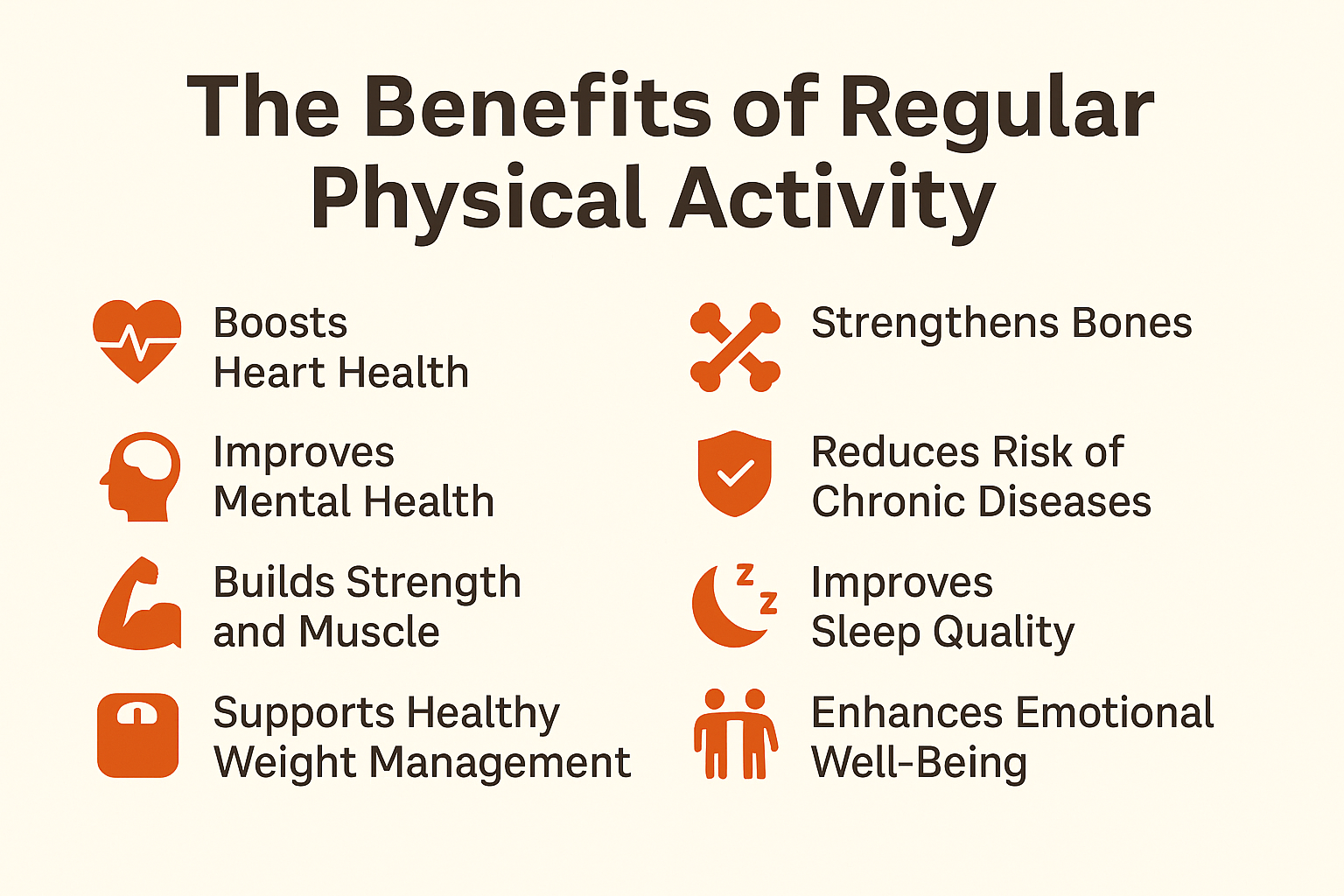Why Moving Your Body Daily Is the Key to a Healthier, Happier Life
We’ve all heard that exercise is good for us — but what does regular physical activity really do for our body, mind, and overall quality of life? Whether you’re going for a daily walk, hitting the gym, dancing, cycling, or doing yoga, moving your body consistently is one of the best things you can do for your long-term health.
This article breaks down the physical, mental, and lifestyle benefits of regular physical activity — and why making it part of your daily routine is a game-changer.
💓 1. Boosts Heart Health
Your heart is a muscle — and like any other muscle, it gets stronger the more you use it.
Regular cardio exercise such as brisk walking, jogging, swimming, or cycling can:
- Lower blood pressure
- Reduce bad cholesterol (LDL)
- Increase good cholesterol (HDL)
- Improve circulation
- Decrease the risk of heart disease and stroke
Even 30 minutes a day of moderate activity can significantly reduce your risk of cardiovascular diseases.
🧠 2. Improves Mental Health
One of the most underrated benefits of physical activity is its impact on your mental and emotional well-being. Exercise triggers the release of endorphins — natural mood lifters often referred to as “happy hormones.”
Benefits include:
- Reduced symptoms of depression and anxiety
- Better stress management
- Improved self-esteem and confidence
- Enhanced focus and cognitive function
- More restful sleep
Even short bouts of exercise — like a 10-minute walk — can lift your mood and clear your mind.
💪 3. Builds Strength and Muscle
Strength training, resistance workouts, and even bodyweight movements like squats and push-ups help:
- Build lean muscle mass
- Strengthen bones and joints
- Improve posture and balance
- Prevent age-related muscle loss (sarcopenia)
As we age, maintaining strength becomes critical for mobility and independence — especially in your 40s, 50s, and beyond.
⚖️ 4. Supports Healthy Weight Management
While diet plays a major role in weight loss, exercise helps you maintain and regulate a healthy weight by:
- Burning calories
- Increasing your resting metabolism (especially through strength training)
- Reducing fat and preserving lean muscle mass
- Curbing appetite and emotional eating
Combined with good nutrition, regular activity creates a sustainable path to fat loss and long-term weight control.
🦴 5. Strengthens Bones and Prevents Injury
Weight-bearing and resistance exercises like walking, lifting, or climbing stairs strengthen not just muscles but your bones. This reduces your risk of:
- Osteoporosis
- Fractures
- Joint pain
- Falls, especially in older adults
Flexibility and balance exercises — like yoga or tai chi — further reduce injury risk by enhancing coordination.
🧬 6. Reduces Risk of Chronic Diseases
Regular physical activity helps prevent and manage a range of chronic illnesses, including:
- Type 2 diabetes
- Certain cancers (breast, colon)
- High blood pressure
- Metabolic syndrome
- Alzheimer’s and cognitive decline
It also helps control blood sugar and insulin levels, which is especially important for individuals with prediabetes or insulin resistance.
🛌 7. Improves Sleep Quality
People who exercise regularly tend to:
- Fall asleep faster
- Sleep deeper and longer
- Wake up feeling more refreshed
Exercise regulates your circadian rhythm and reduces symptoms of insomnia. Just avoid intense workouts right before bedtime — they may be too stimulating for some.
🧘 8. Enhances Emotional Resilience and Focus
Moving your body boosts brain-derived neurotrophic factor (BDNF), a protein that supports brain function, learning, and memory. That’s why regular activity can help you:
- Stay sharper at work or school
- Feel more motivated and focused
- Increase your willpower and emotional regulation
For students, professionals, and parents alike — physical activity is mental fuel.
👨👩👧👦 9. Creates Social and Lifestyle Benefits
Fitness classes, group walks, or joining a local sports team create opportunities for social connection and community. Other lifestyle benefits include:
- Higher energy levels throughout the day
- More productivity and motivation
- A positive body image and self-perception
- Improved quality of life and longevity
Regular movement becomes a lifestyle, not just a habit — and often inspires others around you to do the same.
🔁 How Much Physical Activity Do You Really Need?
The World Health Organization (WHO) recommends:
- 150–300 minutes of moderate-intensity aerobic activity per week (e.g., brisk walking)
- Or 75–150 minutes of vigorous-intensity activity (e.g., running, HIIT)
- Plus 2 or more strength training sessions per week for major muscle groups
But remember: something is always better than nothing. Even 15 minutes a day can make a huge difference.
✅ Final Thoughts: Your Body Is Meant to Move
Physical activity is not about punishing your body or chasing unrealistic goals. It’s about celebrating what your body can do — and giving it the care it deserves.
Whether you’re just starting out or looking to stay consistent, remember:
“The best workout is the one you enjoy and do regularly.”
Make it fun. Make it part of your lifestyle. Your future self will thank you.
